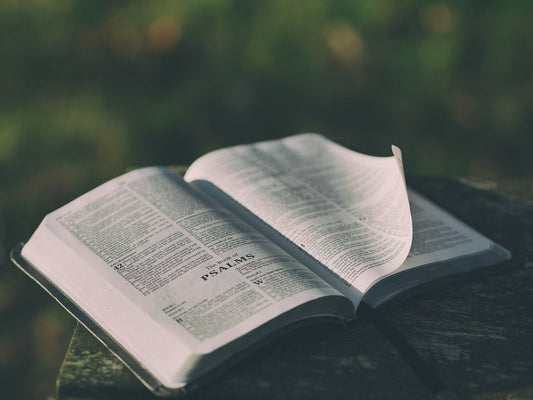
What Does It Mean To Fear God By Emilee Kurt
A Priceless Gift
What’s the most beautiful gift you’ve been given on this side of heaven?
My husband gave me a rose gold ring in October 2018. He knelt on one knee at the church camp where we met and asked me to be his wife. The diamond is oval, with over a dozen tiny diamonds outlining the center. It wasn’t the ring I was expecting at all, proving that he so often knows me better than I know myself. He picked the engagement ring, and soon after I picked out my wedding band while zoning out in art history class — a rose gold vine illustrating both John 15 and Psalm 128. Psalm 128:3 says: “Your wife shall be like a fruitful vine in the very heart of your house…” and I wanted a reminder of my calling every time I twisted my ring round and round.
Another prized possession of mine is a Greek New Testament I was given by my pastor and mentor in high school. His Greek professor gave it to him, and he gave it to me after a significant milestone in our Greek lessons. It’s a comfort to me to always have nearby during my quiet time. Though I have misplaced anything from the coziest sweatshirts to essential kitchen items through all my college travels and post-grad moves, I always know where my Greek New Testament is.
How often do we lose items in our house much larger than a ring?
How often do I misplace other books of less importance?
As we approach the topic of the fear of God, this is key to remember. We don’t take care of the things we have been given because we fear losing them entirely or we fear the rage of the giver. We take care of the most precious gifts we have been given because we love the gift, we respect the giver, and we want the gift to be a significant part of our lives. How much more then am I motivated to care for my relationship with God, thanking Him in word and deed for the gift of my salvation, in light of His dazzling purity and grace!
Work Out Your Salvation with Fear and Trembling
Easton’s Bible Dictionary reminds us that fear of the Lord is, especially in the Old Testament, “a designation of true piety (Pro 1:7; Job 28:28; Psa 19:9). It is a fear conjoined with love and hope, and is therefore not a slavish dread, but rather filial reverence. A holy fear is also enjoined in the New Testament as a preventive of carelessness in religion, and as an incentive to penitence.” This is good news for us, believer! This means that we get to come to God with true grief over our sins, and also the hope of forgiveness. We come to Him fully aware of our unworthiness and get to stand in awe of Him in worship. This biblical fear of God doesn’t leave us stuck in our inactivity because we are afraid of making the wrong move in His Presence or because we are careless about our redemption. We stand secure before Him, and in this place, we know that He is so worthy of our discipline and walking the dusty, grueling second mile in His name.
From Genesis to Revelation, we are warned, invited, and commanded to fear God. The angel affirmed Abraham in Genesis 22 for being willing to sacrifice Isaac because he knew Abraham feared God more than anything else on earth, including his blessings. In Revelation 14, we read John’s prophecy that the angels will say, “Fear God and give Him glory…” The importance of fearing God in Scripture is unquestionable. We know it’s important, but what does it mean? What does this look like in our everyday lives?
“Therefore, my beloved, as you have always obeyed, so now, not only as in my presence but much more in my absence, work out your salvation with fear and trembling, for it is God who works in you, both to will and to work for his good pleasure.” — Philippians 2:12-13
The world tempts us to believe that the command to fear God means that He must not be good after all. But to deny the importance of fearing God is not to grasp the weight of His character, His purity, and His outpouring of generosity to us. If we’re unwilling to worship a majestic God that demands to be feared, we instead worship an idol that doesn’t discipline the one that He loves and therefore isn’t truly holy.
The Lord disciplines the ones He loves. His Presence demands fear, not as an ignorant leader, but because He is the King of Kings. The people of God in the Old Testament barely dared to audibly utter the name of Yahweh. Why? Because they understood the weight of His glory.
What if working out our salvation isn’t about running endlessly for the acceptance Jesus has already provided, but an awe-filled, reverent cherishing of the gift we’ve been given? To fear God means to care more for His delight than the approval of man or the desires of our flesh. To fear God means to see His holiness rightly and ask Him to refine what is within us that does not belong in His presence. To fear God means to come to Him in awe, and it impacts every decision we make:
If you find yourself bored with God or unassuming of His grandeur, ask Him to increase your imagination and childlike faith once again. In this, we are not inventing facets of who He is, but we have to constantly remind our self-oriented minds that He is beyond what we can fathom. Read Isaiah 6. Remind your heart that a repentant sinner does not stay hardened in the presence of God, but rather cries “Woe is me!” against the background of dazzling purity and power. His grace will surely carry you from “Woe is me” to “Here I am”, but you must not forget your rightful place under His authority.
When we were stuck in our sin, He saw beyond our cravings in the flesh to what we truly needed - eternal life. He gives us all that we need for eternity, and we also see that the fear of God leads to a more fulfilling, vibrant life on this side of heaven. A healthy fear of God leads to stronger life decisions that lead to our flourishing. We know His discipline and are humble recipients of His pruning hand. We go to God and strong leadership for counsel, we don’t lean on our own understanding or trust in the chariots of men. Respond in worship by acknowledging that Jesus is not an add-on or an accessory in your life, He is the foundation on which everything now stands. We see this clearly in Ecclesiastes 8:12: “Though a sinner does evil a hundred times and prolongs his life, yet I know that it will be well with those who fear God, because they fear before him.”
We do not fear Him because He threatens to take away the gift of our salvation. Just like I pack the trusty New Testament with me and routinely clean my wedding rings, I am not worried about the anger of the giver. On the contrary, I am filled with joy! I want to be diligent in caring for the gift entrusted to me. A faithful steward does not forget to invest in what will surely multiply - so the Christian does not forget to work out their salvation. Similarly, God has given me a body and sustains my breath, but it is my job to exercise my muscles and use what He has already given. Charles Spurgeon says it this way: “We work out what the Lord works in. The grace of God is not a reason for idleness, but for diligence. As both will and work are given us of God, let us will with firm resolution and work with dauntless perseverance; for so shall we fulfill the pleasure of the Lord.”
Dear Christian, be filled with reverence as you look up to our holy Father, and may your response be a lifelong “Here I am!” before Him.




